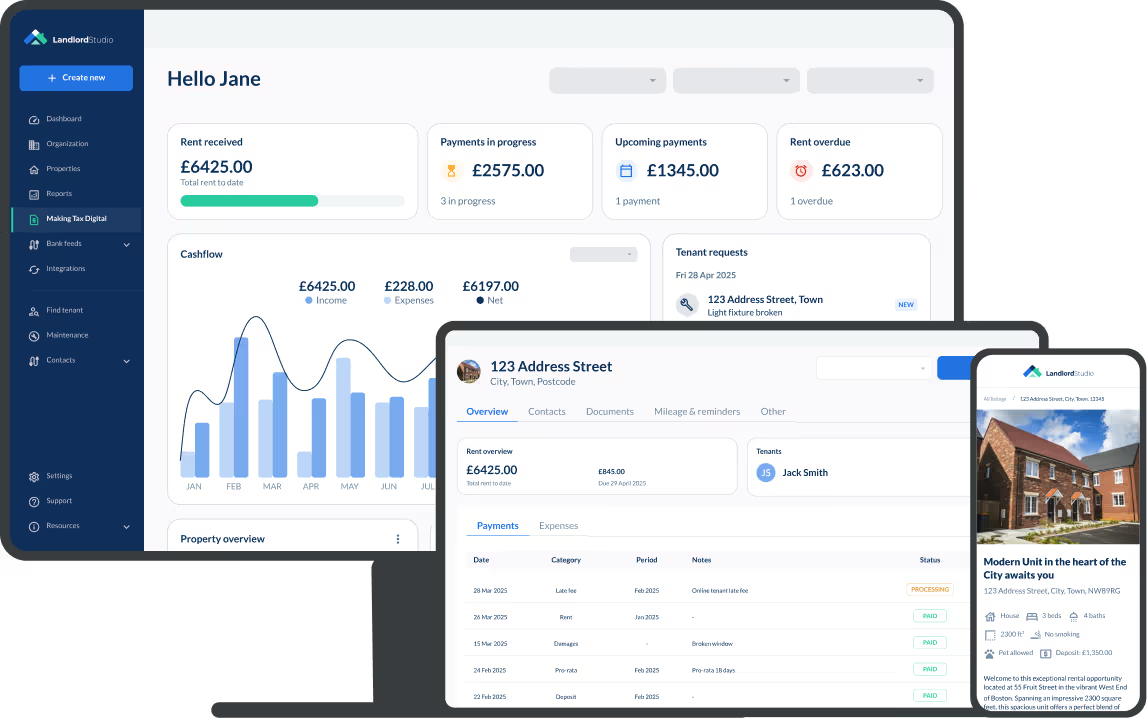Welcome! Where would you like to log in today?

Sign up and get
PRO free for 14 days
Once your PRO trial is over you can continue using Landlord Studio GO completely free.
By continuing you agree to our Terms & Conditions.
Learn how to run UK tenant credit checks, what to look for, and why they’re essential for avoiding rent arrears and protecting your rental property.
.jpg)
Written by
Ben Luxon
PUBLISHED ON
Jul 24, 2025
When you rent out a property, you're handing over a big responsibility, and you want to be doubly sure it’s in the right hands. A tenant credit check can give you a clear picture of who you’re handing the keys to and help you dodge the trouble and stress that late and unreliable payments bring.
With tighter rules and stronger tenant protections coming into play in 2025, skipping that check is even more reckless than it has been in the past.
Scroll on for a breakdown of how credit checks actually work in the UK, when to use them, what to watch out for, and how to stay on the right side of the law. We’ve also gathered tips from landlords who’ve been there, so you can learn from their lived experience and make better calls when letting out your property.
A tenant credit check gives landlords insight into a prospective tenant’s financial reliability — including their credit score, payment history, County Court Judgments (CCJs), insolvencies, and more. It doesn’t show everything (like how much cash they have), but it can reveal patterns of missed payments or serious financial issues.
You’ll typically use a UK-recognised Credit Reference Agency (CRA) such as Equifax, Experian, or TransUnion. Some tenant referencing services (like OpenRent) bundle credit checks into full screening packages.
Importantly, under UK GDPR rules, you must get the tenant’s explicit consent before running a credit check. That means no backdoor checks. It must be upfront and fully transparent.
There’s no legal requirement to run a tenant credit check, but it’s considered best practice as part of the tenant referencing process. Particularly in light of the Renters’ Rights Bill, which will abolish Section 21, making tenant evictions more complex, costly, and time-consuming.
Running a check reduces your risk of dealing with rent arrears and helps you spot red flags early on. It can also help you to make an informed decision on whether a guarantor is needed.
More than anything though, it just gives you peace of mind, which is priceless.
“You wouldn’t lend thousands of pounds to someone without checking their credit history. Renting is no different,” says Paul Shamplina of Landlord Action, a leading UK eviction specialist.
Right after shortlisting an applicant, and before signing anything.
Don’t waste time checking every enquiry that comes in via SpareRoom or OpenRent. Wait until you’ve got a few top candidates then run checks before offering the tenancy.
Always keep proof of consent (ideally via a signed application or email confirmation). Without it, you could fall foul of FCA or data protection regulations.
There are two main ways to run a tenant credit check:
Running a tenant credit check is only useful if you know how to interpret the results. Here’s what to focus on when reviewing a tenant’s credit report:
These are major red flags. A CCJ is issued when someone fails to repay a debt and the creditor takes legal action. If a tenant has unresolved CCJs, they may struggle to pay rent reliably. While there are exceptions to the rule, the general sentiment among landlords is that a CCJ is a dealbreaker.
This r/UKlandlords reddit thread evidences this view. One landlord wrote:
‘IMO it’s not worth the risk. Just reject the application and move on. The EA acts in their interests not yours’
Repeated missed payments on credit cards or utility bills suggest a pattern of financial instability. A few late payments from years ago might not matter but recent defaults should cause more concern.
If a tenant is carrying a high debt load, especially relative to their income, they may struggle to prioritise rent.
Being registered to vote at their current address helps verify a tenant’s identity and indicates they’re settled. If they’re not on the roll, you may want to request additional ID checks.
Credit reports also show previous addresses and any other names the applicant has used. Discrepancies here can signal identity fraud or someone trying to hide financial history.
Multiple credit applications in a short time may suggest financial distress. It could mean they’ve been denied credit or they’re actively seeking it.
.jpg)
A failed tenant credit check doesn’t automatically mean “no”. It depends on the reason and the context.
There are several half measures you can take to make the tenancy viable without denying it outright. For example, you might decide to ask for a guarantor, or request some rent upfront.
You can also speak with the tenant. Sometimes there’s a good reason (e.g., a divorce, redundancy) and they’ve since recovered.
It’s also worth noting that many referencing providers give tenants a “pass”, “fail”, or “refer” outcome with a detailed recommendation. So don’t treat credit checks as binary. You should just lean into them as part of your decision making process.
So, do you really need to run a tenant credit check?
If you’re serious about protecting your investment, then yes. A credit check offers a clear picture of a tenant’s financial reliability and helps you avoid costly arrears and evictions.
But credit checks aren’t about finding the ‘perfect’ tenant. It’s more about spotting red flags and having informed conversations. Combine the report with references, ID verification, and a gut check during the viewing. And where needed, consider safeguards like guarantors or advance rent.

From securely storing referencing documents, to tracking rent payments and automating communications, Landlord Studio helps you run professional rental portfolio.
Create your free Landlord Studio today and take the stress out of rental property management.